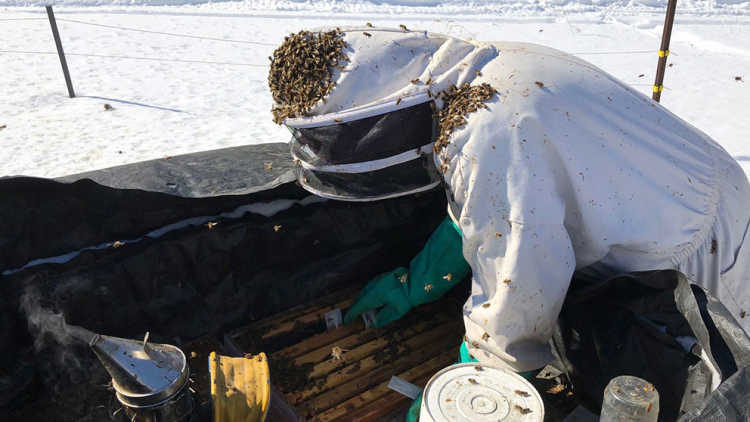Thriving at the hive, FCC celebrates honey farm operator on International Women’s Day

Photo credit: Julie Shirley, Blue Heron Gardens
Julie Shirley didn’t set out to ace the apiary business, but the success of her honey farm proves she’s got what it takes.
Julie is the primary owner and operator of Blue Heron Gardens near Cudworth, Saskatchewan. The farm is dedicated to producing high quality, Canadian Food Inspection Agency (CFIA) approved honey, in an environmentally friendly way.
The quarter section Julie and her husband Jeff bought about a decade ago was intended as an escape from the city and a place for Julie to grow a market garden business.
“In the beginning we were both working in the city, but we had a dream to buy some land and change our lifestyle,” explains Julie.
After building a log home on the farm and spending their summers there, in 2014 they quit their city jobs and moved to the farm full-time with Jeff running his own tech business.
When the market garden business proved challenging to earn a living off, the couple saw another opportunity buzzing around their farm.
“We had planted fruit trees out here from the University of Saskatchewan’s fruit culture program,” says Jeff. “There are sour cherries and Haskaps. We originally had two beehives to pollinate them but that turned into 12, 20, 60 and so on.”
Blue Heron Gardens now has 265 hives and produces about 50,000 pounds of honey each year. Julie also sells the beeswax that’s created from making honey to the hobbies and crafts market.
“There’s very little waste in making honey and at the same time the bees are pollinating crops and increasing farmer yields. They will fly about two miles from their hive. Farmers are usually happy to have you put bees on their land,” explains Jeff. “The bees create more food for the supply chain so it’s a very environmentally friendly business where you’re improving it and giving back to the earth.”
Mentorship matters to business success
The science of beekeeping is something Julie is relentless in learning. She and Jeff credit their mentor and fellow beekeeper, Tony Lalonde for giving them the knowledge needed to be successful and recognizing Julie’s talent, encouraging her to focus on that part of the business.
“We were really lucky to have a good mentor with the bees, he’s helped us be successful,” says Julie. “I love to learn. During the mentorship I would take all the notes and try to improve everything.”
“The bees are livestock”, adds Jeff. “No different than having 200 head of cattle we have 20 million head of bees. Julie applies her science training to the husbandry of the bees. She also has very steady hands. You need steady hands and good vision. She’s not scared of them. If you watch her work the bees, she’s in there with no gloves and the bees are crawling all over her.”
Sweat equity
Starting a business is a lot of work, especially a farm business on the wind-swept prairie. With Jeff’s agtech background, they are committed to innovation and technology. Still, the road isn’t easy. In the busy season from April to October, Julie puts in plenty of 16-hour days. All those hours didn’t add up to a profit in the early years so financial help was a must.
Julie received a grant through the Federal government’s Women’s Entrepreneurship Fund. She also worked with Farm Credit Canada (FCC) to finance a new honey plant on their farm.
“We would not have been successful without FCC. We built a brand-new facility which helped streamline everything and it was so much easier this year,” says Julie.
Jeff added, “The new honey plant is creating cash flow in honey for the bee business, it’s allowed Julie to have a wonderful career here at the farm,” says Jeff.
Christa Galaura, FCC Relationship Manager in Saskatoon saw the potential in their plans. “They are in good shape for the honey production they need and there’s room for expansion.”
“They want to create jobs in the local community, they’re very open to mentorship. Not only learning from mentors but starting to mentor others. They keep learning and it delivers results. This year’s crop sold at a premium because their quality was so good.”
Julie has started her own queen cells, which means she doesn’t have to import the queen bees from outside the country. That’s another step along with becoming CFIA registered and approved that supports the premium product customers are looking for.
“Becoming CFIA approved means our honey can be sold in stores and internationally. Means more market and a better quality product and a better price for pound selling it. It’s not a backyard quality, it’s kitchen grade, ready to go to the food supply market,” said Jeff.
While the market garden still holds a special place in her heart, Julie has grown to love beekeeping. “It’s more than just a job, it’s something you are committed to and you love. That’s why you put all your hours into it and all your effort. I’m a nurturer and I like taking care of things so that’s why it’s a good fit for me.”
FCC is Canada’s leading agriculture and food lender, with a healthy loan portfolio of more than $41 billion. Our employees are dedicated to the future of Canadian agriculture and food. We provide flexible, competitively priced financing, management software, information and knowledge specifically designed for the agriculture and food industry. As a self-sustaining Crown corporation, we provide an appropriate return to our shareholder, and reinvest our profits back into the industry and communities we serve. For more information, visit fcc.ca.
-30-
For interviews or photos, contact:
Jill McAlister
Corporate Communication
Farm Credit Canada
306-540-4840
jill.mcalister@fcc.ca